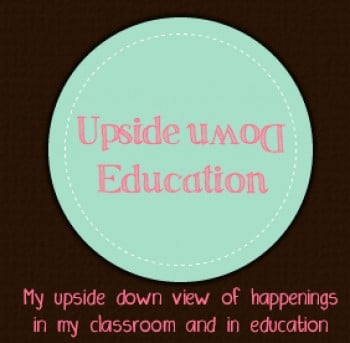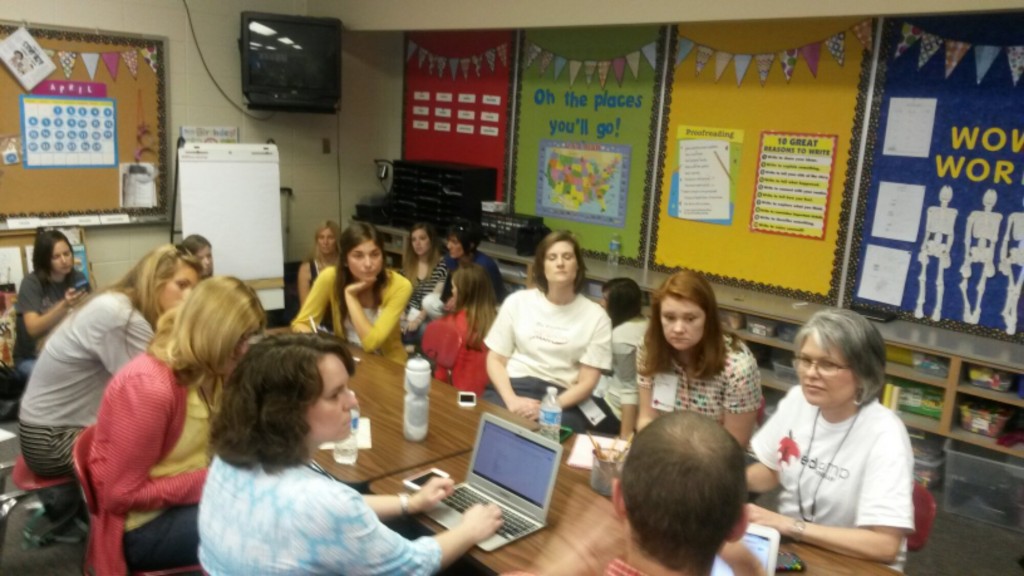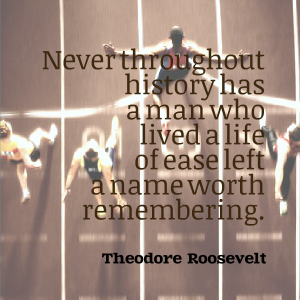A lot is going on in my head right now. It was a busy weekend, mostly due to EdcampBham Saturday. It’s my favorite weekend, but usually my most stressful. This year due to some health issues and the craziness of this past school year I vowed to not be stressed. Luckily we had new teammates as well as the team we have had in the past that pulled off an amazing event. This year, with my vote to stay worry free, I was more “present” for the day.
For the first session my friend, Tom Murray, signed us up to do a session on professional development. He had done this session in the past so he knew where to start. If you have ever met Tom, he had a huge happy personality so it only took minutes for him to take over the session so I mostly stepped back, made a few comments and let it all soak in. We had the group discuss what is wrong with traditional PD. We got the answers we expected: sit and get and no follow through and support afterwards. They then discussed new ideas in PD and pretended to be head of a school and made a PD plan. It was a fantastic session that wasn’t a gripefest but became an ideafest. OK so hold this thought on this session because I’m coming back to it. Promise.
Also this weekend, I made a video to go with an article for THE Journal I was interviewed for. If you know me, you know that I can get up on a stage of 1000s and I don’t get nervous and love it. But me and my southern accent on video is enough to make me a wreck. But the video was on a topic I thought was pretty important, so I agreed to it. The article was on using interactive white boards in BYOD classrooms. I focused mostly on ClassFlow and it’s benefits in the BYOD classroom. I answered this question “How do you manage a classroom with all those devices and the whiteboard being used all at once?” So as I’m recording my video I’m discussing teachers rolls have to change, etc (actually recording a million times), I had a sinking feeling in my gut and started thinking about that session I did at edcamp earlier that day.
I’m a hypocrite. You see I’m the “tech rep” at my school. I’m in charge of the technology PD there. We are also a BYOD district. We were not until around November, tech reps were to inform the teachers and send home permission slips with each student. It was a hard transition in middle of the year. But I did just that. Then wondered why not many students took advantage of this and why teachers who are constantly complaining about lack of tech did not either.
Now I know why, it is all my fault. I can make excuses, I am teaching a new PBL tech course 5 times a day to 125 kids where I’m writing the curriculum as I go, I also teach one science class everyday. I also have 2 kids of my own who have a pretty active afternoon schedule. But excuses aren’t acceptable. When student learning is at stake I can’t make them. The central office never offered us (yes us because I would attend, even if I know this stuff bc I need to pass it on) training and even if they did its hard to expect teachers to drive to the district office 30 minutes away and it’s intimidating to some. I knew this and so I should have stopped up in my building. I should have found someone to cover my classes or stayed after school and net with every single teacher. At least those who were interested in using tech in their class. I know they don’t want more PD but I could’ve done something to get them there.
Few weeks ago I wondered why my district and school was not embracing BYOD like districts I read about in blogs and articles. Well it’s my fault. No one (ME, not pointing fingers here I’m taking the blame) said hey here is where to start, here is a new, free, product that can help. I never modeled for them. Seriously even if you are a techy, the idea of sending kids loose on cell phones and tablets is pretty scary. You’re entire job changes and we (I) expect teachers to jump on that. What the heck is wrong with me?
The problem is when you are BYOD and do it correctly, it is more student centered and students actually are more engaged. We need that. We should want that. But without walking teachers through their role changes, how can we expect that. Think about how many (usually boring sit and get) PD sessions we have just for new textbook or new standards. BYOD is a new textbook, heck it almost replaces them. Why was this over looked?
So to all of my coworkers apologize. I did you wrong. I cheated your students out of learning. To those who attended our PD session Saturday, I apologize for being a hypocrite. I just became one of those who do PD and you think “they have no clue what is like in a real classroom.” One of those in the session is a coworker of mine, I’m surprised he didn’t call me out. I’m glad now Tom was Tom and had the room’s attention so I didn’t put my foot too far in my mouth. I apologize to y’all, my readers, because y’all know how passionate I can be about PD yet I’m apparently just fooling y’all. But thank you for taking the time to read my blog and putting up with my struggles. I do have a plan for coming next year, hope I will get to put it into place. I will make the time. I have to, learning is at stake.


